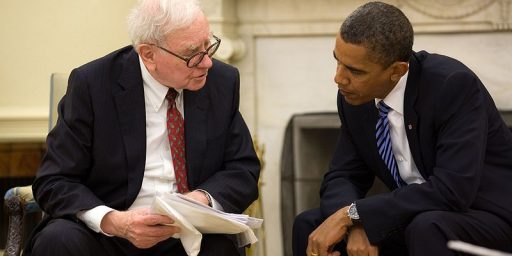Friedman Finds His 3rd Party Candidate: Obama
Thomas Friedman continues his quixotic quest for a third party. His candidate: a fantasy Barack Obama.
Thomas Friedman continues his quixotic quest for a third party.
Watching this campaign unfold reaffirms how much it would have benefitted from a serious, centrist third-party challenger. It would have been so clarifying to have an independent voice calling out Mitt Romney for running a campaign that consists of decrying the last three and a half years of the Obama presidency, while offering to reinstate the very same failed policies that made the eight years of George W. Bush a disaster that President Obama has spent most of his time cleaning up. And it would have been equally clarifying to have an independent challenger calling out Obama for failing to put a credible, specific economic plan on the table — at the scale of our problem — but relying instead on a campaign that amounts to a series of discrete appeals to each of the Democratic Party constituencies.
He’s got a good point here. Without a third-party challenger, who could possibly attack Obama’s failed policies or Romney’s lackluster counter proposals? I mean, aside from Romney and Obama and their surrogates in two existing parties?
But there will be no third-party candidate, so the only hope is getting Obama to raise his game.
The only hope for whom? I mean, he’s already been president three-and-a-half years. Might I suggest that this is his game? So, if you don’t like it, wouldn’t it make more sense to wish Romney would raise his game? Anyways,
To do that, the president needs to recognize just how badly he wasted Warren Buffett — using him for a two-week, wedge-issue sugar high.
Obama got Buffett to endorse the “Buffett Rule” — a minimum tax rate of 30 percent for any individual who makes more than $1 million a year so that all millionaires have to pay a higher tax rate than their secretaries. The plan had no chance of passing, would have made only a small dent in the deficit and was rightly decried by experts as a gimmick that only diverted attention from what we really need: comprehensive tax reform that can substantially raise revenue in a fairer manner. The Buffett Rule has largely faded away.
Right. But, again, that’s Obama’s game. Maybe that’s the best he’s got?
Buffett is a businessman out to make a profit. But he is respected by many as a straight-talking nonpartisan — someone who can “call the game.”
You know who thinks Warren Buffet is a “straight-talking nonpartisan”? Thomas Friedman, that’s who. I like and respect Buffett but he’s a Democrat. He makes no bones about that. Indeed, he’s a Democrat who, unencumbered by a need to please voters, expresses views well to the left of most Democratic politicians. Which is just fine an dandy, of course, but it hardly makes him a “straight-talking nonpartisan.”
What the president should have done is follow the advice of the Princeton University economist and former Fed Vice Chairman Alan Blinder, namely lay out a specific “three-step rehab program for our nation’s fiscal policy.” Call it the Obama Plan; it should combine a near-term stimulus on job-creating infrastructure, a phase-in, as the economy improves, of “something that resembles the 10-year Simpson-Bowles deficit-reduction plan — which would pay for the stimulus 15-20 times over” and a specific plan to “bend the health care cost-curve downward.” Obama has already offered the first; he still has not risen to the second and the third would be an easy extension of his own health care plan.
Well, since Obama didn’t create or endorse it, perhaps we should call it the Blinder Plan. Obama commissioned Simpson-Bowles and promptly rejected it, apparently deciding that his embrace would kill it. And, I don’t want to call Thomas Friedman a moron or anything, but was he watching the health care debate? There was no “easy extension” to be had.
Obama needs a second look from independents who could determine this election. To attract that second look will require a credible, detailed recovery plan that gets voters to react in three ways: 1) “Now that sounds like it will address the problem, and both parties are going to feel the pain.” 2) “That plan seems fair: the rich pay more, but everyone pays something.” 3) “Wow, Obama did something hard and risky. He got out ahead of Congress and Romney. That’s leadership. I’m giving him a second look.”
Uh huh. Again, the main has held the job that Friedman wishes him re-elected to for almost four years. If “hard and risky” were his style, he’d have done it. Instead, he’s deferred to Congress and tried to build consensus at the final hour. It might work for a community organizer and, hell, it might work for a president in a different atmosphere. But let’s not expect Obama’s entire personality to change between now and November.
I’d bet anything that if the president staked out such an Obama Plan, Buffett and a lot of other business leaders would endorse it. It would give the G.O.P. a real problem. After all, what would help Obama more right now: Repeating over and over the Buffett Rule gimmick or campaigning from now to Election Day by starting every stump speech saying: “Folks, I have an economic plan for America’s future that Warren Buffett and other serious business leaders endorse — and Mitt Romney doesn’t.”
That’s a good point. Most Americans, after all, are looking to billionaires for their political queues. In fact, nobody’s more popular right now than wealthy investors. Oddly, however, this approach hasn’t worked for Mitt Romney, who seems to be the candidate favored by serious business leaders.
Obama loyalists often say: “Those Republicans are so bad. They’ve tried to block us at every turn.” Yes, the G.O.P. has tried to stymie Obama; it’s been highly destructive. But the people who keep pointing that out don’t have an answer for the simplest next question: Why have they gotten away with it?
My view: It’s because too many Americans in the center-left/center-right do not feel in their guts that Obama is leading — is offering an economic plan at the scale of the problem that has a chance for bipartisan support and that makes them want to get up out of their chairs and do battle. Our situation is different from four years ago; people want to know the president has a plan for getting out of this mess.
But there’s a small problem: he doesn’t. He’s had most of a presidential term to formulate and announce one and, well, he hasn’t.
When the Grand Bargain talks with John Boehner fell apart, Obama retreated to his base when he should have rallied the center by laying out — in detail — the Grand Bargain the country needs. That would have forced Romney to speak in detail about his plan — the Paul Ryan plan — and reveal it for what it is: a radical plan that few Americans would embrace if they understood it.
Then people would see a real choice: a tough-minded-but-centrist plan with real bipartisan support versus a radical plan to gut Medicare, give more tax cuts to the already wealthy and drastically shrink discretionary spending so eventually nothing is left for education, veterans, roads, research, the F.B.I. or the poor.
But, instead, they have a choice between the president they have now and something else.
And the morning after that happens — when Warren Buffett endorses the Obama Plan, not just the Buffett Gimmick — the president will have his mojo back.
Oddly, however, Buffett endorsed the Buffett Gimmick and very little mojo seemed to come with it.







Fisking Tom Friedman ought to be an Olympic Sport. Then again, it’s probably too easy to qualify.
Tom Friedman: The Dumbest Man In The Room.
Isn’t the fantasy Barack Obama we’ve already got good enough?
He’s merely one of at least three NYT op-ed writers (joining Bobo and Maureen Dowd) in a race to the bottom. Beyond parody at this stage.
@Doug Mataconis:
It should be done like hot dog skiing—it’s not getting down the hill or how fast you do it that’s important. It’s the style points.
I wonder if somebody (maybe JJ himself) would tell me a) which of Obama’s policies have failed and b) what should have been done instead. A legitimate answer to b) is, of course, nothing.
Is this really how that went down? The commission failed its own internal vote to formally endorse their proposal.
And yet this man sells millions of copies of every book he publishes? Why? Who buys them? Do they actually read them? And if so, are they awake when they do it?
Ah, yes. The Mustache of Understanding.
I didn’t know that Friedman now writes for the The Onion. When did that happen?
To say the least, Friedman is not a very astute observer of the current conservative movement if he actually thinks that Warren Buffett would instantaneously be accorded respect by Republican conservatives. Republicans already have a “straight-talking” multi-billionaire – Michael Bloomberg – and they don’t seem to be in any hurry to respect him.
@bk: Ross “the solution to all problems is to act like a moderately prudish Catholic” Douthat should be in the mix as well.
@Stan: Given that state of the economy is worse than the worst-case scenario Obama pointed to when telling us his stimulus plan must be approved or else, I’d reverse the question: which of his policies have succeeded?
@Franklin: I had in mind an Ezra Klein post, which I’ve now linked, that I just read a couple days ago but actually come out in February.
@James Joyner: Thanks for your thoughtful answer.
@Stan: I’ve been arguing for 20 years or so that presidents are only marginally responsible for the economy. I don’t much blame Bush for the recession that started on his watch or much blame Obama for not having fixed it. But the reality is that Obama ran against the Bush economy and now Romney is running against the Obama economy; that’s how this thing works.
I do think the Obama stimulus was misdirected. I supported a stimulus but one that pumped money into the economy directly. And going all in for ObamaCare meant no opportunity to do a big program to restructure our national spending priorities. Nor did it even do much to solve the problem of healthcare costs taking us over the fiscal cliff.
Of course, even if Obama had some magic plan in his pocket, he’d have had difficulty getting it passed. But he did have control of the House and almost 60 votes in the Senate when he started.
@James Joyner: Ah yes, “almost 60 votes in the Senate”. You say that as though it were a working majority or something.
As for president’s influence on the economy, I understand why you believe they have little. List presidents and GDP growth or unemployment during their terms and then rank them. Doesn’t Michael Kinsley do this every few years? Easy enough to do yourself. You get a very striking result. There’s an overlap of Carter, Nixon, Reagan in the middle. Otherwise the top of the list is blue, the bottom red.
Haven’t done this myself for years. That HW Bush, Clinton, and W Bush fit the pattern was obvious without calculation. Obama would now be an outlier if you look at inauguration to present. Lag a year, as Kinsley does, and as only seems fair, Obama probably is at the middle.
This has held for 50 plus years and is well known. Republicans have spent a lot of ink rationalizing it. Krugman admits he can’t explain it. (Not sure he’s said anything lately.) My own hypothesis is simply that Dems have been less prone to doing something really stupid: deliberately causing a big recession, wars, ill thought out tax cuts.
James, you have to believe presidents have little influence because to believe othrwise would force you someplace you don’t want to go.
Finally, definitive proof that James Joyner is a liar:
The prosecution rests.
@James Joyner: Ahh, thanks, that puts some more meat on the bones. Not exactly an outright “rejection”, but a tactical maneuver that didn’t work.
@James Joyner: Thanks, and this time I mean it.
@James Joyner:
Well, given that the economy was in significantly worse shape than anyone thought at the time that worst case scenario was developed, it’s plausible to argue that the stimulus worked. Some serious economic studies have made that case, any way:
http://www.washingtonpost.com/blogs/ezra-klein/post/did-the-stimulus-work-a-review-of-the-nine-best-studies-on-the-subject/2011/08/16/gIQAThbibJ_blog.html
By the way, is there a conservative Ezra Kelin out there? If so, please let me know!